
Late Postclassic Period
Sala
Chichimeca Migrations
Several northern Chichimeca groups arrived in the Puebla-Tlaxcala valley approximately 800 to 900 years ago. Among them were the first Tlaxcaltecs, who followed an ideology of conquest, were highly warlike, and acted under the protection of their god, Camaxtli.
They settled primarily in Tepeticpac, a mountainous area that was easy to defend, where they founded their first "altepetl" (plural "altepemeh"), a Nahuatl term meaning “indigenous town,” which the Spanish later adopted. This site became the predecessor of the province of Tlaxcallan.
Fierce Rivals: Tlaxcaltecs and Mexicas
The Tlaxcaltecs were frequently at war with their neighbors, especially the Mexica from Tenochtitlan, who were expanding their empire into the Puebla-Tlaxcala region. In their attempts to conquer Tlaxcallan, the Mexica imposed an economic blockade that lasted for nearly 60 years, up until the arrival of the Spanish in 1519.
Tlaxcaltec Government and Confederation
When Spanish forces reached Tlaxcallan, they encountered a vibrant and well-organized society formed by a confederation of more than twenty multiethnic "altepemeh". Their government was collective—there was no supreme ruler. Leadership was shared among the "teuhctli", the principal lords of the "teccalli", or noble houses of each "altepetl".
The Teccalli
The "teccalli", or noble house, was the central institution of political, economic, and social organization among the Tlaxcaltecs. Each was headed by a "teuhctli" (principal lord) and included nobles, "macehualtin" (commoners and tributaries), "teixhuihuan" (distant relatives), and "tlatlacotin" (slaves).
Sultepec-Tecoaque and the Spanish Caravan Sacrifice
Sultepec-Tecoaque was a town under the dominion of the Acolhua of Texcoco. In 1520, the local population intercepted a Spanish caravan and sacrificed its members during the Panquetzaliztli festival. This led to the place being called Tecoaque, meaning “place where they were eaten.” In retaliation, Hernán Cortés ordered that “the town where his people had been captured and sacrificed be destroyed and laid to waste.”


